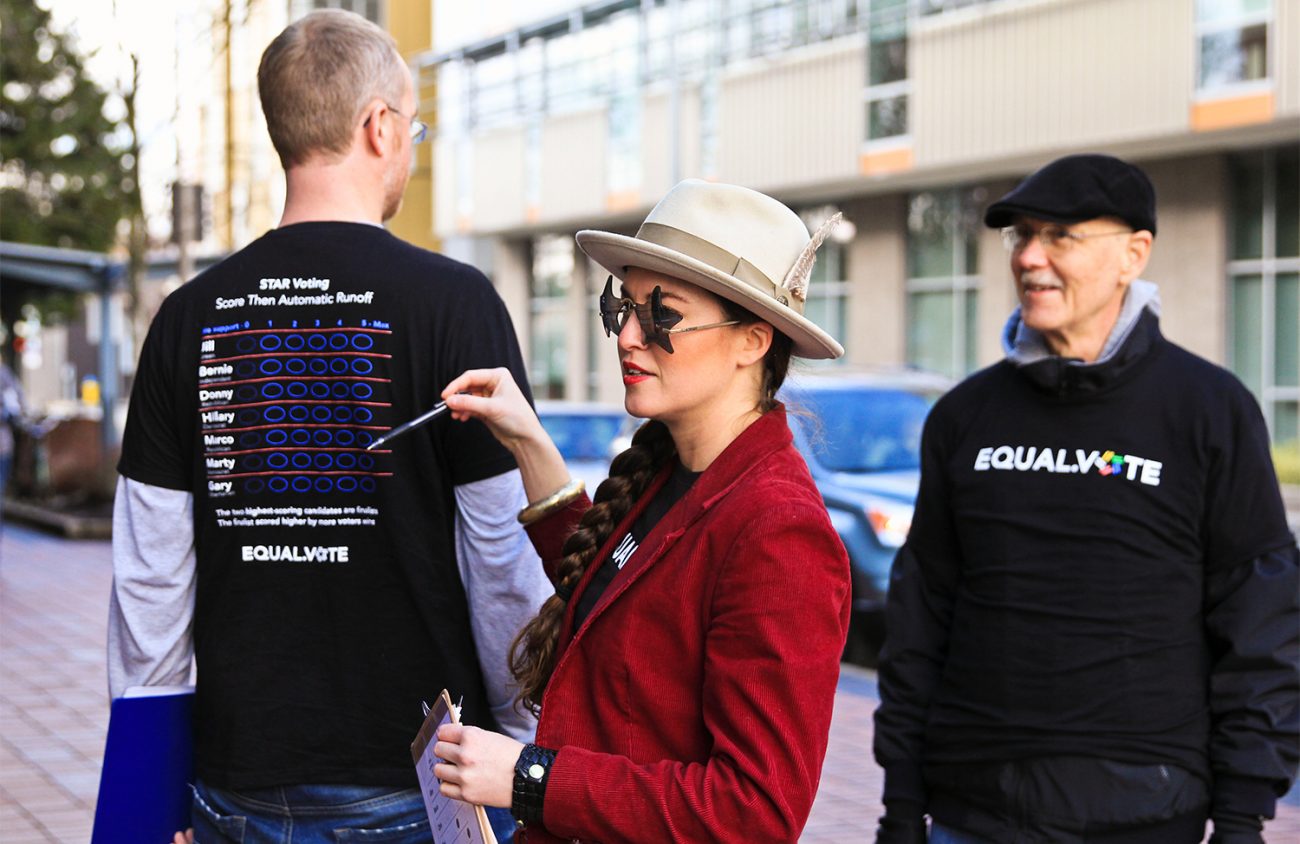Sara Wolf says she’s heard a consensus that voters feel the current election system doesn’t work while campaigning for Score Then Automatic Runoff (STAR). Equal Vote Coalition, the campaign in support for STAR, believes STAR can fix the system.
If Lane County voters pass Measure 20-290 in November, the STAR experiment will start with nonpartisan races. Supporters say the system could work on larger scale — and in partisan — races, too. Before November, though, Eugene Weekly will offer readers an opportunity to try STAR.
STAR voting is a two-round voting system, but voters need cast only one ballot. Voters use a rating system on candidates — from zero to five stars. The two candidates with the highest overall score head to the finals.
If none of the candidates you liked make it to the second round, your preference for finalist candidates will still be reflected. In other words, using the 2016 presidential race as an example, maybe you gave Jill Stein five stars. But it came down to Donald Trump and Hillary Clinton, who you gave zero stars and two stars (respectively). Clinton still gets your vote.
Supporters say it gets rid of casting a vote for the “lesser evil,” and would remove any issues of voting your conscience (like voting Green Party) because it doesn’t have vote splitting. As a result, Mark Frohnmayer, founder of Equal Vote Coalition, says STAR eliminates the need for candidates and voters to feel the need to “toe the party line.”
Since politicians would have an opportunity to run a campaign on what they truly believe, honesty in politics could emerge, which could lead to a spectrum of political opinion on ballots, Wolf says. She adds that while two-party domination is baked into U.S. elections, STAR would undo that.
Frohnmayer says STAR would assist in taking big money out of nonpartisan races. Candidates would only have to raise money for one election — rather than both primary and general elections.
“Voters no longer have to support only one of the two most well-funded candidates,” he says.
This could mean grassroots candidates would have a chance to win an election.
“In STAR voting, you could have a candidate run purely grassroots, and voters wouldn’t have this disincentive to support them,” Frohnmayer says. “We may be pleasantly surprised that we find out a less-funded candidate that we all like actually wins the job in STAR voting”
Frohnmayer adds that, for example, Buch and Williams (the finalists for the East Lane County Commissioner position) have to “go back to the well” and ask their donors for more money for the general election.
Current campaign activity records show that Williams has received $110,000 in campaign contributions, with large contributions from timber and construction firms such as Seneca Jones Timber Co. On the other hand, Buch has received $107,811, with largest contributions from unions such as AFSCME.
STAR would remove a need for primary elections, which historically have lower turnouts. For example, the midterm primary election in May had a turnout rate of 36 percent. That election, however, had three commissioner positions up for grabs.
Frohnmayer says that, although STAR is only on the ballot for nonpartisan races, he believes it could be used in partisan elections or, at the least, lawmakers in Salem could allow STAR be used statewide for nonpartisan races.
“It could save counties a ton of money in election administration,” he says.
Frohnmayer adds that STAR could lead to more civility in politics.
Another alternative election format, ranked-choice voting, is in use. Ranked choice voting has voters assign their preference for candidates in order, so politicians who rely on dirty campaign tactics could be penalized by receiving lower rankings.
Although STAR supporters see ranked-choice voting as a flawed alternative to the current election process, the state of Maine now has ranked-choice voting for statewide elections. A side product of ranked-choice voting is that it can influence more civility in politics, says Kyle Bailey, spokesman for the Committee for Ranked Choice Voting.
“It’s been a game changer with our politics,” he says.
Maine politicians felt threatened by the change and opposed the reform, he adds. Voters approved the change to ranked-choice voting, but the Maine Legislature vetoed the law.
However, Maine voters, who supported the new ballot, challenged that veto through a “people’s veto,” a ballot initiative to overrule the Maine lawmakers.
Frohnmayer says STAR voting fixes some of the problems found in ranked-choice voting, such as that it doesn’t maintain the rule of one person, one vote.
The main backer for the STAR ballot measure is STAR Voting for Lane County committee. The committee has received nearly $56,000 in contributions. Most of the contributions come from Frohnmayer, founder of Equal Vote Coalition and a Eugene-based entrepreneur known for the Arcimoto electric car company, according to the Oregon Secretary of State records on campaign activity.
Equal Vote Coalition tried to have STAR on the ballot in Multnomah County for the general election but didn’t gather enough signatures by the deadline.
Although Lane County voters will decide STAR’s fate in future elections, EW’s “Best Of Eugene” election will serve as a guinea pig for STAR.
